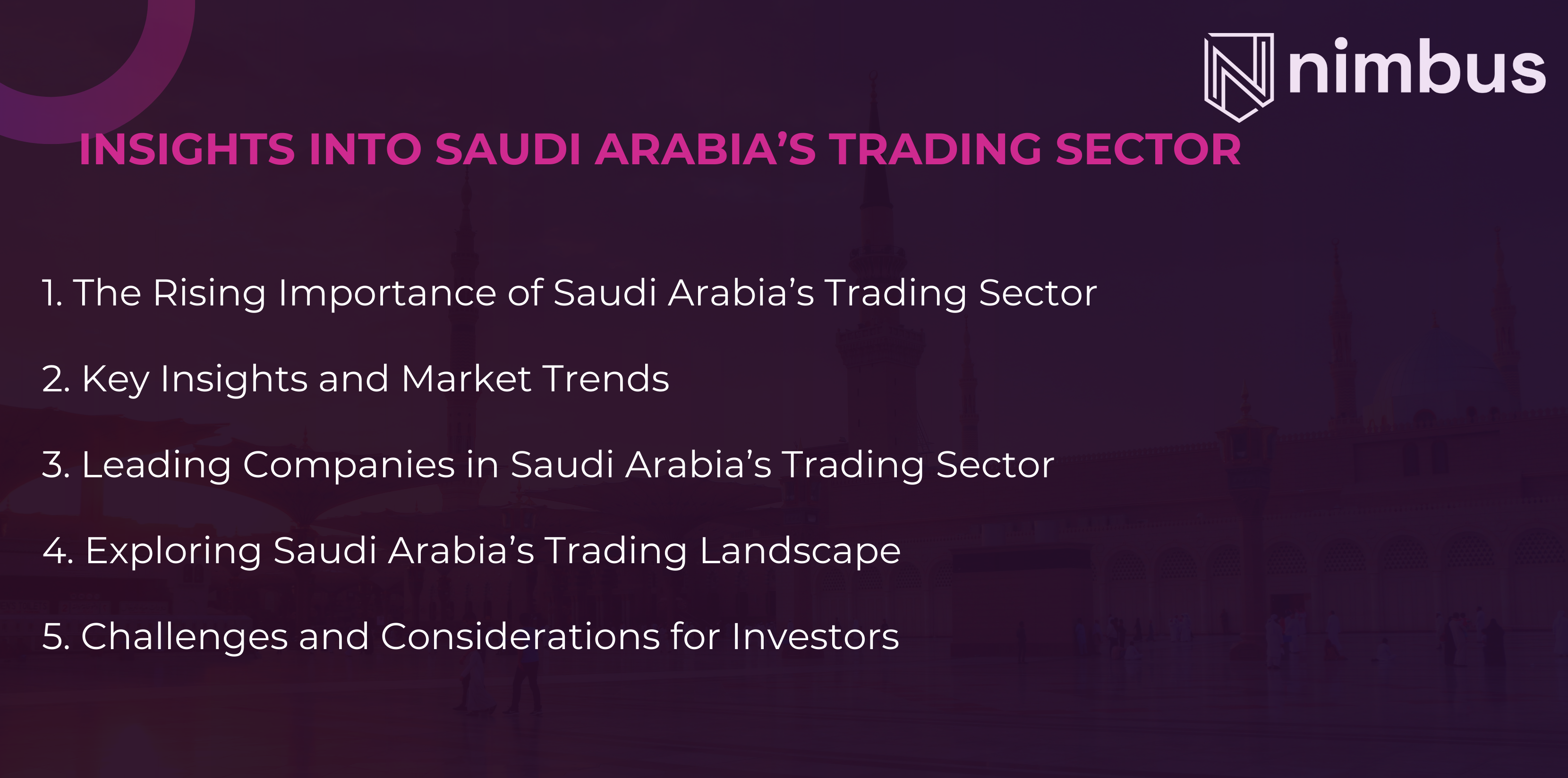Saudi Arabia is making remarkable economic growth and some key sectors flourishing through its initiatives include tourism, green energy, technology, AI, and trading. The trading sectors offers immense opportunities for both local and foreign businesses.
The KSA’s strategic location, economic stability, and government-led initiatives under Vision 2030 make it an attractive destination for companies looking to expand their reach.
With a strong consumer base, extensive trade infrastructure, and a growing import and export market, Saudi Arabia is positioning itself as a regional and global trading powerhouse.
This post gives you key insights, market trends, and major players shaping Saudi Arabia’s trading sector, providing valuable information for businesses and investors interested in entering this dynamic market.
INSIGHTS INTO SAUDI ARABIA’S TRADING SECTOR

1. The Rising Importance of Saudi Arabia’s Trading Sector
Saudi Arabia’s trading industry has a pivotal role in the nation’s economy, with significant growth in non-oil exports, imports, and infrastructure investment. Several factors make Saudi Arabia a prime destination for business incorporation into the trading sector.
- Economic Diversification – The country is actively reducing its dependence on oil and focusing on non-oil industries, including trade, logistics, and manufacturing.
- Government Investment – The government has allocated $100 billion for trade-related infrastructure development, ensuring a strong and modernized trading ecosystem.
- Market Growth – The trading sector is expected to reach SAR 13.2 trillion by 2030, reflecting its vast potential for businesses.
2. Key Insights and Market Trends
Saudi Arabia’s trading landscape is undergoing rapid transformation, driven by supportive policies and economic reforms. Some key insights include:
- Non-Oil Export Growth – Over the past five years, non-oil exports have increased by 40%, showcasing the success of economic diversification efforts.
- Expanding Import Market – In 2022, Saudi Arabia imported goods worth over $160 billion, a figure that continues to rise annually.
- Investment in Infrastructure – The government’s $100 billion investment plan aims to increase trade facilities, ports, and logistics networks, ensuring smooth and efficient trade operations.
- Projected Growth – The trading sector is expected to grow at an annual rate of 6.2% over the next five years, indicating strong demand and future expansion opportunities.
3. Leading Companies in Saudi Arabia’s Trading Sector
Several leading companies have established themselves as key players in Saudi Arabia’s trading industry. These firms have contributed significantly to the country’s economic development and serve as examples of successful trading enterprises.
– Abdul Latif Jameel (ALJ)
- One of the most influential business groups in Saudi Arabia.
- Diversified operations in automotive, infrastructure, and consumer products.
- Known for its commitment to sustainability and global expansion.
– Kanoo Group
- A major trading powerhouse with over 130 years of experience in the industry.
- Operates in shipping, travel, and commercial services.
- Recognized for its excellence and strong market presence.
– Al-Rashed Group
- A leading name in Saudi Arabia’s trading sector, with investments in real estate, manufacturing, and construction.
- Known for its contribution to corporate social responsibility.
- Plays a vital role in the country’s economic progress through large-scale trade operations.
4. Exploring Saudi Arabia’s Trading Landscape
Saudi Arabia’s trade sector benefits from a well-developed infrastructure, government support, and a large consumer base. Businesses looking to enter this market should consider the following factors.
Market Size and Expansion
- The Saudi trading sector is valued at SAR 13.2 trillion and continues to grow.
- Increasing demand for consumer goods, industrial equipment, and construction materials presents new opportunities.
– Government Support and Vision 2030
- The Saudi government is actively reducing trade barriers and simplifying business regulations to attract foreign investments.
- Trade policies have been revised to encourage global partnerships and market expansion.
– Investment in Trade Infrastructure
- The government has allocated $100 billion for new ports, logistics centers, and road networks to enhance trade efficiency.
- Expansion of industrial cities and special economic zones will further boost trade activities.
These developments position Saudi Arabia as a competitive destination for businesses seeking to establish a strong presence in the Middle East.
5. Challenges and Considerations for Investors
Despite its attractive business environment, companies looking to enter the Saudi trading sector should be aware of potential challenges.
– Regulatory Requirements – Companies must comply with Saudi trade laws, import/export regulations, and business licensing procedures.
– Market Competition – The sector is highly competitive, with both local and international players vying for market share.
– Economic Fluctuations – While Saudi Arabia is diversifying its economy, oil price fluctuations can still impact overall market conditions.
By addressing these challenges proactively, businesses can navigate the Saudi market more effectively and leverage its vast opportunities.
– Future Outlook and Growth Potential
Saudi Arabia’s trading sector is on a strong growth trajectory, supported by government reforms, increased investments, and global trade integration. The key factors shaping the future of the industry include:
- Expansion of e-commerce platforms and blockchain-based trade solutions will redefine the market.
- Increased foreign investments with more international businesses entering Saudi Arabia, bringing expertise and innovation to the sector.
- Infrastructure expansion with ongoing projects in ports, airports, and industrial zones will further strengthen the country’s trade capabilities.
- The shift toward green supply chains and eco-friendly logistics solutions will influence business operations.
TRADING BUSINESS INCORPORATION IN THE KSA
Saudi Arabia’s trading sector presents a dynamic market for businesses looking to expand in the Middle East. By leveraging Saudi Arabia’s modern trade infrastructure, economic reforms, and growing market demand, businesses can capitalize on the nation’s trading potential.
However, navigating regulatory requirements and market challenges is essential for long-term success. For companies looking for business setup in Saudi Arabia, strategic planning and an understanding of business regulations will be key to thrive in the trading sector.



